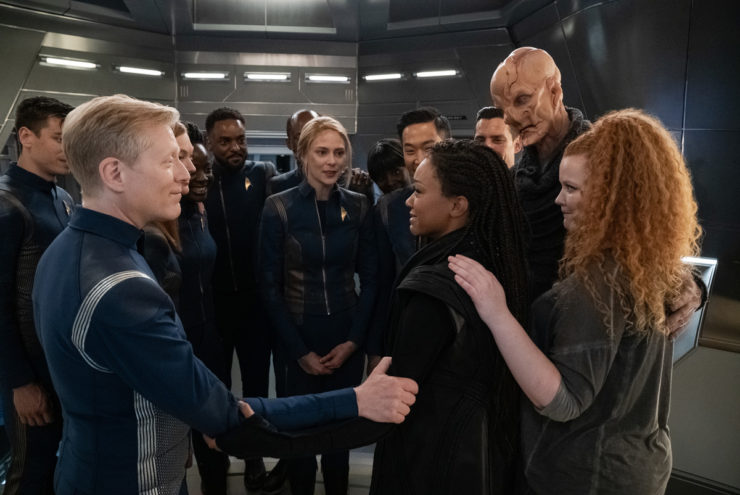For the first time in its three-year history, Discovery kept a show-runner and a stable writers room for an entire season, and the difference in consistency and quality is marked. Plus one of the biggest issues with the show—that the technology in a show that takes place ten years prior to the original series looks more sophisticated than that of the 24th century in the 1987-2001 spinoffs—is solved by bouncing the crew into the 32nd century.
As a result, we have Discovery’s finest season.
The question of course is whether or not the season is successful, and I have to say that it mostly is. One of my greatest frustrations with all the new onscreen Trek output from 2001-2019 is that it’s been entirely retreading old ground. Finally, what with the first season of Lower Decks taking place right after Nemesis (the previous end point of Trek storytelling), the first season of Picard taking place twenty years after that, and now Discovery jumping another eight centuries past that, Trek is finally doing what it had been doing up until Enterprise debuted in 2001 and what it should’ve been doing all along: moving forward.
The setup of this third season bears more than a passing resemblance to the 2000 TV series Andromeda starring Kevin Sorbo, itself based on several notions by Trek creator Gene Roddenberry, and telling the tale of a time-displaced vessel that tried to reform a great nation that had fallen asunder in the time the ship was away.
It works even better here than it did twenty years ago on that syndicated drama, because to people watching Discovery, the Federation actually means something, thanks to five decades of Star Trek stories. One of my biggest issues with Andromeda was that I had no investment in the Systems Commonwealth, so I didn’t care about restoring it. The show also did a crappy job of showing how bad life had gotten in the post-Commonwealth era. (Andromeda really could’ve used the battered-down sleaze that other science fiction oeuvres like Farscape and the Alien movies had.)
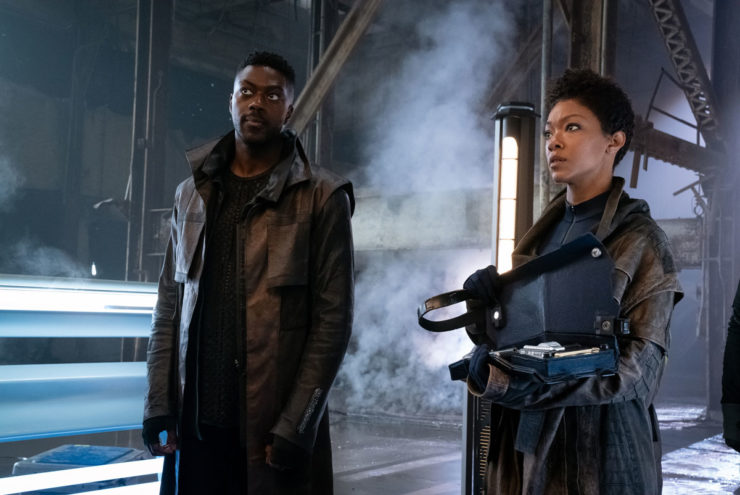
To their credit, Discovery does an excellent job over the course of the first four episodes showing how much more difficult life is in the post-Burn galaxy: Burnham gets kidnapped by thugs and drugged, Saru and the gang have to negotiate with thugs, Earth is isolationist and paranoid, and Trill is only marginally better than that. And then once they find the Federation in “Die Trying,” it’s a shadow of its former self.
Even the hopeful future of the Planet Formerly Known as Vulcan—which has been renamed Ni’Var and on which Spock’s dream of uniting the Vulcan and Romulan people has at last come true—is tinged with conflict, as the reunification of the sundered Vulcan species is not a smooth one, fraught with politics and difficulty.
Once the plot kicks in, the conflict of the season plays out, which finds a fascinating, and sometimes even successful balance between the usual Trekkian ideals and the action-adventure component that has bled over to the TV side from the movie side (where it’s, rather depressingly, been an important component of the franchise since 1982). Which means that we get to mix compassion (Saru working with the man-child Su’Kal to get him to leave the broken-down holodeck that has been his only home since he was a child) and diplomacy (Burnham pleading her case on Ni’Var, Vance and Osyraa’s negotiations) with pew-pew action-adventure (Burnham and Book escaping the exchange, Saru, Georgiou, and Tilly freeing themselves from Zareh, all the Mirror Universe stuff, the taking back of Discovery).
But the show didn’t lose track of Trek’s strongest suit: the characters. There’s lots of nifty stuff here, starting with Burnham adjusting to life in the future and her burgeoning relationship with Book, not to mention her confronting her demons with the help of her mother (a very welcome return by Sonja Sohn). Georgiou gets to learn how much she’s changed from being in the nicer universe, and gets a hard lesson in the notion that you can’t go home again. Tilly is given a baptism of fire as acting first officer, and is good at the carry-out-the-captain’s-instructions part, not so much at the command-the-ship-while-the-captain’s-away part. Detmer suffers some serious PTSD from going to the future, and in general the rest of the bridge crew starts to round into focus a little more, from their gathering at the big tree in San Francisco to their working together to escape custody.
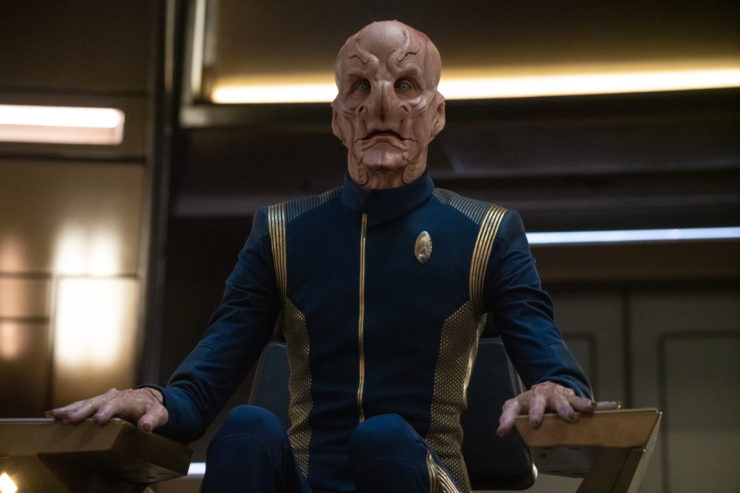
The best, though, are Culber and Saru. Culber has evolved nicely into the prototypical Gene Roddenberry doctor: good at medicine and also good at being a guide to his patients. It’s the role both Boyce and McCoy played, and which both the EMH and Phlox would play on the spinoffs, and Wilson Cruz does amazing work with the role. Burnham is the heart of Discovery, and Tilly is the compassion, and Saru is the intellect, but Culber is the soul.
Best of all is our third captain in three years. After the mendacity of Lorca and the friendly compassion of Pike, we now have the embodiment of intelligence and diplomacy in Saru. Watching Saru grow into the role of captain is a joy to behold, from his asserting his authority with Georgiou to his attempts to bring the crew together in this strange future to his delightful conversations with Ni’Var’s President T’Rina to his continued awareness of the needs of his crew, balanced with the needs of his mission and orders.
We also get lots of new characters, notably Cleveland Booker, charmingly played by David Ajala; Adira Tal, played with complexity and verve by Blu del Barrio; Admiral Vance, the latest refutation of Trek’s not-entirely-earned reputation for all admirals being evil (like Kirk being a maverick, it’s one of the truisms that has taken root in Trek lore without actually being accurate), played with Oded Fehr’s usual relaxed intensity; Su’Kal, a magnificent melding of very old and very young by the great Bill Irwin; and Osyraa, a spectacular disappointment of a villain, despite the best efforts of Janet Kidder. The clever leader trying to make the best of a bad situation in “There is a Tide…” would’ve been great to have throughout the season, but it’s bookended by the incredibly boring mustache-twirling villain of “The Sanctuary” and “That Hope is You, Part 2.”
Osyraa isn’t the only disappointment. Stamets is mostly portrayed in relation to other characters. I like his paternal relationship with Adira, but he’s entirely defined by other people this season: Adira, Culber, and in the end his anger with Burnham. There’s very little of him. Nhan is clumsily written out in “Die Trying.” Reno plays no role of significance in the season (though, as ever, her banter with Anthony Rapp’s Stamets in “Far from Home” especially is brilliant), and while the bridge crew does indeed get more to do, they could hardly have gotten less, and there needs to be more there there.
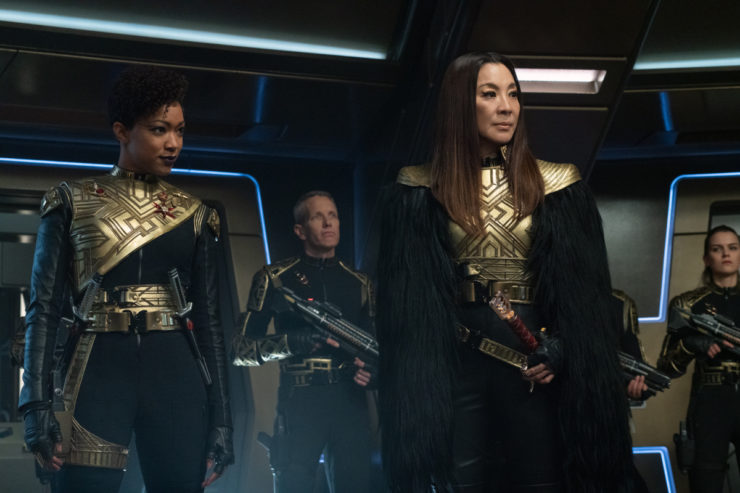
In addition, we waste the better part of two episodes writing Georgiou out so she can go back in time for her Section 31 spinoff. It would’ve been a lot easier to just not have her go into the future with the rest of them at the end of season two, and also given the other stories in this season more storytelling space (which many of them desperately needed). Indeed, there’s a general feeling from this season that many of the plot threads could’ve used a bit more air to breathe, and not wasting time cosplaying in the Mirror Universe with the Guardian of Forever would’ve helped with that. (Having said that, Paul Guilfoyle’s Guardian is magnificent.)
And the plot point of the lullaby that everyone knows is completely dropped. Red herring or writing fail? You be the judge!
Buy the Book
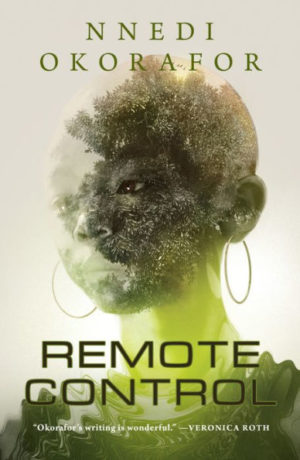

Remote Control
That particular loose end notwithstanding, the writing is more coherent this season. Season one was a show written to be binged that was then released in two sets of weekly drips and drabs over five months, thus utterly spoiling the flow of the narrative. Season two started out as a show about one thing, and very obviously became a show about a different thing at the end, as the writing showed the seams of the behind-the-scenes turmoil.
Season three, though, provides a nice balance of standalone episodes with moving the plot along. It’s less serialized than the prior two, but still with a continuing narrative. For one thing, this gives Discovery individual standout episodes, which have been rare in the prior two seasons. “Su’Kal” and “Unification III” and “There is a Tide…” are all particularly strong.
Plus, we get some good development of several cultures, notably the Trill, the Vulcans and Romulans, and the Kelpiens, and some fabulous guest stars in del Barrio, Guilfoyle, Fehr, Sohn, Irwin, Phumzile Sitole, Adil Hussain, Ian Alexander, David Cronenberg, Tara Rosling, and the great Christopher Heyerdahl.
It’s far from a perfect season, but it’s a step in the right direction, to wit, forward. We don’t just get a new adventure, we leave the field wide open for more in subsequent seaons, and it was a lot of fun getting there. The acting remains incredibly strong, with some superlative visuals provided by a strong stable of directors (old standbys Olatunde Osunsanmi, Hanelle M. Culpepper, Maja Vrvilo, and the great Jonathan Frakes, as well as some newcomers).
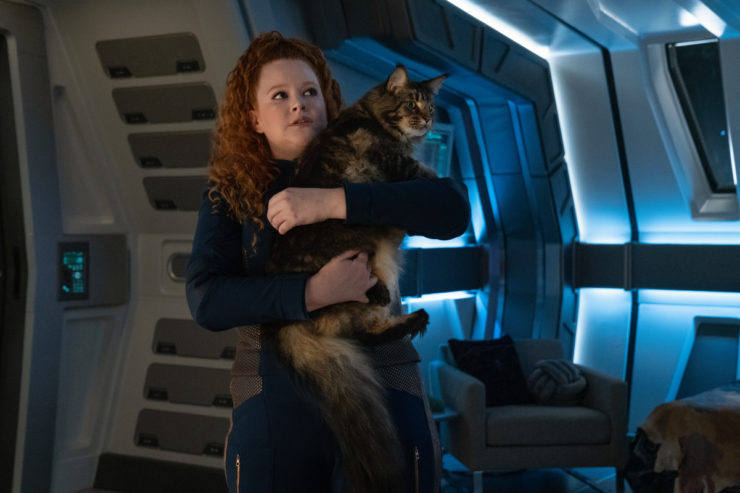
There’s been no indication when we will see season four—or, indeed, the next season of any of the shows. The ongoing apocalypse has slowed everything down, and while production has commenced on season four, there’s no release date for it yet. Neither Picard season two nor Strange New Worlds season one have started production yet, no new Short Treks have been announced, and there’s been no start date for Prodigy announced yet, either.
It’s frustrating, after a calendar year that gave us thirty-three new episodes, to not know when there will be more, though in the meantime, there’s always licensed fiction! Since the last time I talked about Discovery tie-ins, there’ve been two new novels, Dead Endless by the late great Dave Galanter, about Stamets and Culber; and Die Standing by John Jackson Miller, about Emperor Georgiou of the Terran Empire; both of which are definitely worth checking out.
Keith R.A. DeCandido wrote the first-ever tie-in novel to Andromeda, which was entitled Destruction of Illusions and was released in 2003. His latest novel is Animal, a thriller he co-wrote with Dr. Munish K. Batra about a serial killer who targets people who harm animals.










